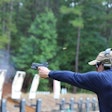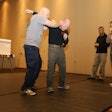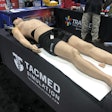Long-time readers of POLICE will quickly realize that this isn't the typical "Officer Survival" story. This department of the magazine is usually dedicated to discussions of techniques that you can use in the field to ensure that you go home after your shift alive and in one piece.
But allow me to take this opportunity to discuss an important training issue that could save your career or help you advance it. Yes, I know this issue is not as exciting and interesting as ways to disable an attacker when the chips are falling, but believe me, it's critical to your long-term career survival and satisfaction.
There's not a cop in America who doesn't worry about being sued for an action that he or she took on the job. You can do everything according to policy and still find yourself having to respond to a complaint or prepare a legal defense. It's not fair; it's not right; it just is. And when the legal snakes come after you, you'll need proof that you are a highly trained and professional law enforcement officer.
Sadly, if you wait until you are the subject of a complaint to gather records of your service and training, you may find your hindquarters flapping in the wind. Now is the time to cover your butt.
Curriculum Vitae
The Latin term "curriculum vitae" literally means "course of one's life." This document is, in short, a biographical outline of your job experience and training. Most cops don't need a CV or résumé to apply for their positions, but that doesn't mean you shouldn't have one. The reason that you should keep a CV is to document your training. Otherwise, I'm sorry to say, the records of your training may not exist.
Reality Check
Yes, I know that your state's training commission should be keeping records of all of your law enforcement training. You can trust them to do that if you want, but my advice is don't bet your career on it.
Some state training commissions may only keep the information that is specific to their state requirements. In addition, they may not record specialized training symposiums. And other training that is not recognized by the state commission or that was conducted out of state also may not be eligible for the database. So you may have huge gaps in your training record. It is not my intent to bash your state training commission or your agency. All I'm saying is that they have thousands of records to maintain, and yours is not their priority. So if you want your records accurate, keep a copy for yourself.
As a former training director, I can tell you that paperwork can get lost, there are human errors, and computer systems can have their faults. It's your career, so take the time to document your training.
Time Well Spent
OK, I know that the last thing you want to do in your off time is more paperwork. But taking just a few minutes to document your training now can save you hours of trouble down the line.
A while back I was contacted by an officer who was named in a lawsuit. His department had to produce his training records. Which was bad for him because there were some "bookkeeping errors" that actually showed him to have lost his law enforcement certification by administrative regulation.
Not having his certification and enforcing the law, especially when this incident occurred, could have been disastrous for him and his agency. Luckily, he maintained his training diplomas and records to thwart this near legal disaster.
Granted, that's an extreme case. What's more likely is that you will need your records to move up in your career. Recently, I was contacted by an old friend who was about to vest. With his pension vested, he was pondering the idea of seeking a chief's job or a second career as an instructor but was clueless on how to assemble paperwork for either quest. Gathering paperwork from a 25-year career can be an arduous task and sometimes it's next to impossible. But if you maintain copies of your own training records as you go along, it's a snap.
Keep Your Handouts
Another reason to maintain your own training records is so that you have proof of training programs that you attended outside of the agency. Should you attend such a specialized training program, remember this one suggestion: Keep a copy of all course material and handouts. You may also want to document the names of the instructors and your fellow classmates.
Having this information not only helps you document your training, it also gives you a solid foundation for presenting procedural and policy change suggestions to your superiors.
Record Keeping
Make sure that you store your records in a safe place. Some officers I know use filing boxes. Others have actual file cabinets in their homes where they store all sorts of important documents, including their training records. Whatever works for you is fine.
The same is true of how much information you maintain. It can be as simple as keeping copies of diplomas or records of attendance. Beyond that, you can get fancy and do things like scan the documents into a computer and make a copy on disc. That's a great idea if you have the means and the desire, but it's not necessary. I don't really have recommendations on how to store your records. My primary focus is on getting you to keep them. However, I do have some suggestions on what to keep.
Maintain a chronological list of your training. This list should include the date of attendance, title of the course, and the number of training hours. That last one is more important than some of you can imagine. When your judgment or professionalism is called into question, countering with the exact number of training programs and training hours that you have experienced can have great impact. Also, if you have specific expertise in fields like officer instruction, accident reconstruction, crisis negotiation, etc., then documenting your training can lend weight to your testimony as an expert witness.
Beyond Training Records
If you want to keep a full curriculum vitae (résumé) of your police career, then I applaud you. Of course, what you will quickly discover is that the trick to writing a CV is choosing what to leave out. Obviously if you have received any commendations, worked on special projects, or received honors then you should include them and give them prominence.
One of my colleagues who works as an expert witness keeps various papers documenting his work and training history in separate files for each listing on his résumé so that he can validate any and all statements about his career. That may sound a bit anal retentive but, in the legal world, where you must be able to produce the evidence of your expertise, he can do so quickly with no muss and no fuss. Protecting Your Future
The entire process of initially documenting your career experience and training will only require a few hours of your time. And once your system is in place, you can add new information with just a few lines of type and a few minutes of your off-duty time.
Be sure to check your records against the department's records. I recommend that you do this once a year or so.
And don't forget to document your academic education. Your career is a total package, so your traditional academic pursuits need to be recorded as well.
The goal of this article is to explain how you can prepare in advance for a last-minute demand to produce your training files. But there are a few bonuses that you can also gain from taking these actions. For example, by keeping your own training records you can make sure that your career is being properly documented. And having this information ready to go in résumé or CV form means that you are ready to apply for any promotion inside your agency or even a position with another agency.

















